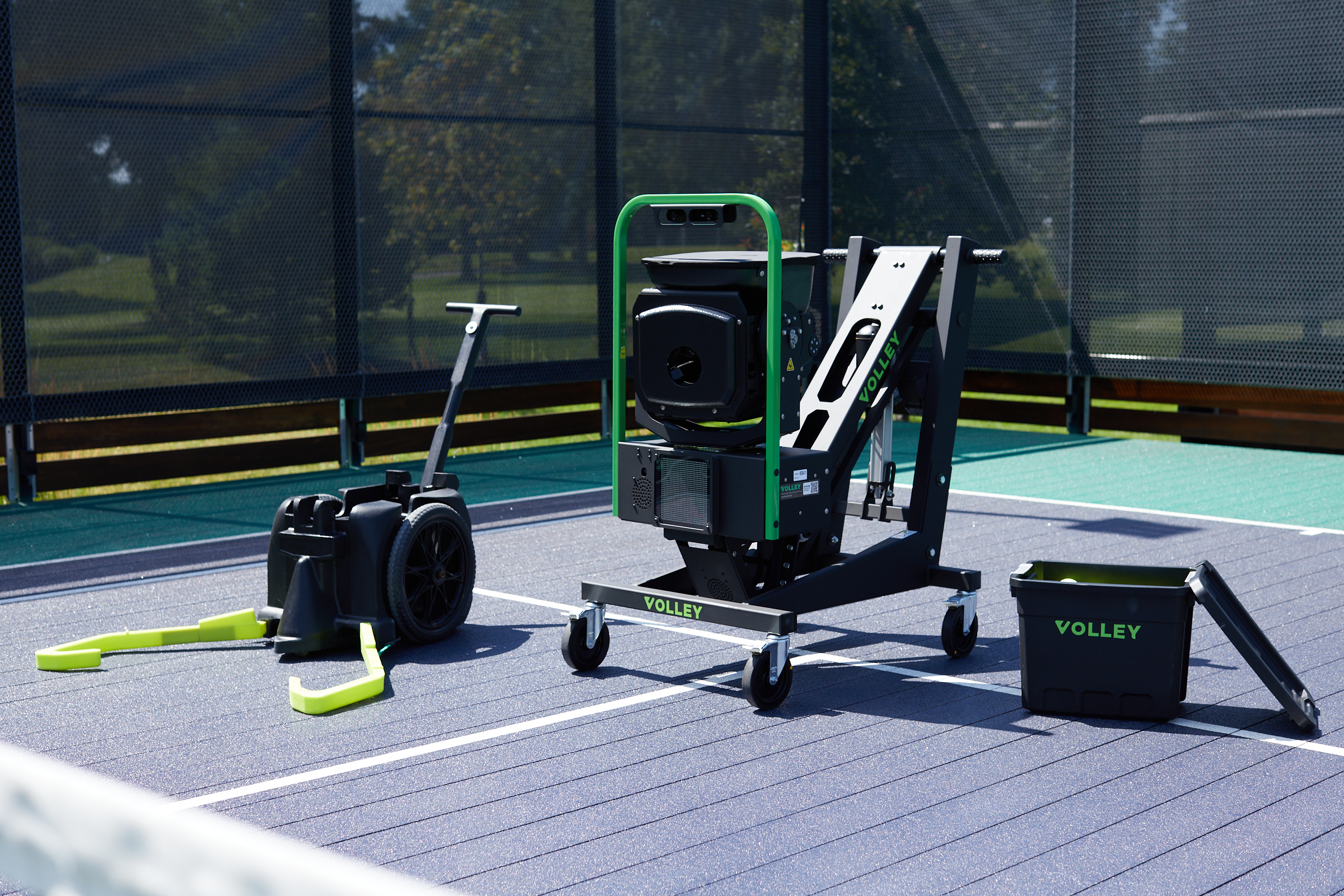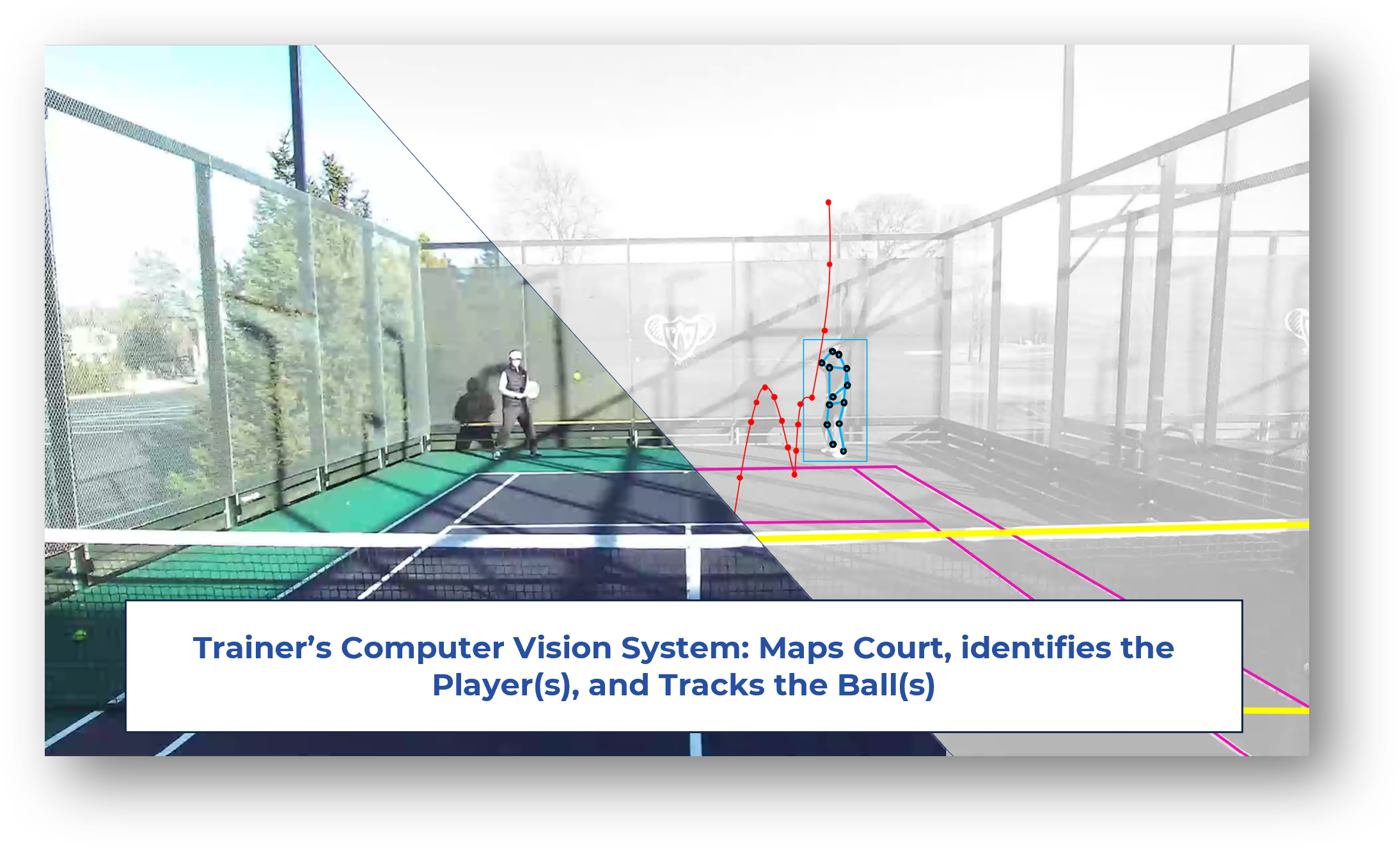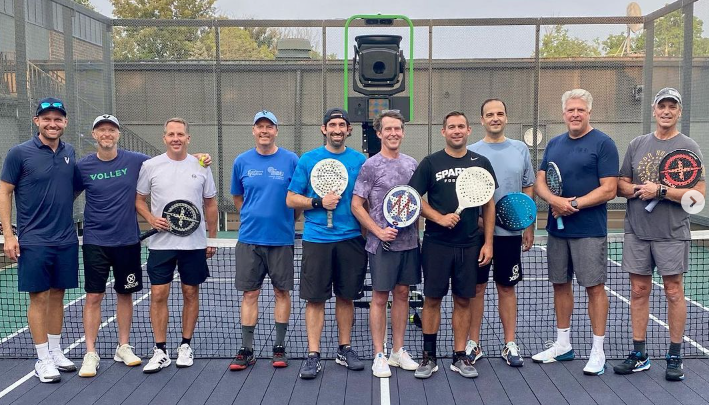A new sports tech startup, Volley, aims to revolutionize the way racquet sports players (platform tennis, padel, and pickleball) train with its AI-enabled sports training machine.
Unlike traditional tennis ball machines that simply launch balls at varying speeds and heights, Volley’s trainer robot leverages AI and vision software to collect data as you play, learn your skill level, and simulate live gameplay– making it so you never need a full team to have a decent training session.
“Volley is a great machine for the pros, the beginners, and everyone in between because of the AI and the smarts of the system,” co-founder and CEO John Weinlader tells TechCrunch. “It understands the game, where you are on the court and responds as if they were a real opponent. So you are playing at a level that you would in a real game.”

Image Credits: Volley
Additionally, Volley has three cameras built into the device for different purposes like person and ball tracking, as well as video recording. One camera lives inside the machine to help with maintenance, letting customer support virtually find the problem and walk you through how to fix it.
Another detail that makes it stand out is the speaker and LED screen so instructors can guide an entire group through workouts. Also, its adjustable height is set to 87 inches, with the ability to tilt 56 degrees up and 38 degrees down and rotate 34 degrees left or right, allowing for a wide variety of shot angles.
Through Volley’s mobile app (available on iOS and Android devices), you can access customized drills, view footage to review your footwork, access player stats and more. You can also digitally control the machine by tapping on your phone to select where you want the ball to land. Additionally, the trainer collects and stores all of that data so when you come back to the club, it will continue from where you left off.
Volley touts 1,007 app installs.
Plus, the company is constantly adding new features. Most recently, Volley added a side-by-side video comparison feature to the app so you can clearly see the differences in your form. At the end of this month, during the RacquetX Conference, Volley will demonstrate its upcoming hand gestures feature, which allows you to control the trainer without a mobile device.

Image Credits: Volley
Volley’s trainers were released in September 2023 and sold out in less than four months. The company distributed 110 trainers to 45 platform tennis and Padel clubs across the U.S., including Connecticut, Florida, Illinois, Massachusetts, Maryland, New Jersey, Ohio, and Pennsylvania.
“As evidenced by our phenomenal growth since launching, we have proven there is demand for our next-generation technology that simulates live play on the court. Other sports solutions, like the golf simulator, have provided people better access to work on their game; this is what Volley delivers for racquet sports,” Weinlader says.
The company charges each club a leasing fee of $1,500 to $3,000 per month. The cost depends on the number of trainers a club needs as well as the number of features used and members served.
It’s currently deploying its second round of trainers.

Image Credits: Volley
Volley was founded by two brothers John and Dan Weinlader, who both have engineering backgrounds and previously built an AgriTech business for John Deer.
As an avid platform tennis player, John came up with the idea for Volley when he decided to put a tennis ball machine up on painter sticks to mimic certain shots.
“With racquet sports, the only way to improve is to go to the court and play with three other players or a pro – and that didn’t necessarily guarantee you would be able to work on the shots that were most challenging for you. I grew really frustrated with the lack of options and finally decided to take matters into my own hands,” John says.
Three years and eight prototypes later, the company developed the trainer that’s on the market today.
There has been quite a bit of tech innovation in the racquet sports space, from Slinger’s portable ball launcher and accompanying app that can record the number of shots and provide personalized coaching tips to Proton, a smart ball machine with internal sensors that ensures balls are delivered where you want them at the right speed and spin. Meanwhile, Swing Vision sells a phone mount that can be attached to the fence so players can record themselves playing. Users upload footage to its AI-powered app that tracks shot placement and provides stats like ball speed and win percentages.
However, Volley believes it doesn’t have an immediate competitor since it combines video recording and ball dispensing into one device, while also taking an AI-driven approach to simulate live play on the court.
“Volley is in a category on its own because the ball trainers of yesterday are no longer meeting the needs of players and pros. We see ourselves as the next-generation solution— just like golf simulators are innovating golfer training,” John says.
“While the popularity of racquet sports has exploded, the technology to support the game has remained unchanged. Paddle is especially nuanced because of its wide variety of shots, ability to play off the screen, and the fact that it is almost exclusively intended for doubles,” he adds.
On the long-term roadmap, the company says it wants to start leasing trainers to individual players who have at-home courts. Volley also recently partnered with the American Platform Tennis Association (APTA) in order to expand its reach.
While the company is entirely self-funded to date, Volley is in the process of raising its first round.
techcrunch.com




